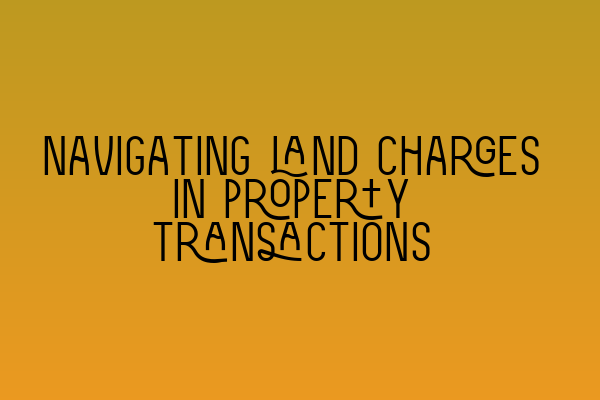Navigating Land Charges in Property Transactions
When it comes to property transactions, understanding and navigating land charges is crucial. Land charges are legal interests or encumbrances that affect a particular piece of land. These charges can have a significant impact on the ownership and use of the property, making it essential to identify and address them during a transaction.
In this blog post, we will explore the various types of land charges, explain their implications in property transactions, and provide guidance on how to effectively deal with them. Whether you are a buyer, seller, or solicitor involved in a property transaction, this information will help you navigate the complexities of land charges.
Types of Land Charges
1. Restrictive Covenants: Restrictive covenants are agreements that limit the use or development of a property. They are often imposed by previous owners or developers to maintain certain standards or preserve the character of an area. These covenants can restrict activities such as building extensions, running businesses from the property, or keeping certain types of pets.
2. Easements: Easements are rights granted over another person’s land that allows the holder of the easement to use that land for specific purposes. Common examples of easements include rights of way, drainage rights, and rights to access utility services. It is important to identify and understand any easements that exist on the property you are dealing with, as they may grant certain rights to third parties.
3. Mortgages: A mortgage is a loan secured against the property, usually to finance its purchase. The lender, often a bank or building society, will have a charge registered against the property as security for the loan. If the property is being sold, the mortgagee’s consent and discharge of the mortgage will be required to complete the transaction.
4. Planning and Local Authority Charges: Planning charges, such as planning restrictions or enforcement notices, can be registered as land charges. Additionally, local authority charges such as outstanding council tax or utility bills may also be registered against the property. These charges need to be settled or addressed before the completion of the transaction.
5. Landlord and Tenant Charges: In leasehold transactions, there may be additional land charges related to the landlord and tenant relationship. These may include rent charges, service charges, or other obligations that are specific to the leasehold agreement. It is important to review the lease and identify any potential charges that may affect the property transaction.
Implications of Land Charges
Land charges can have various implications for property transactions. They may restrict the use of the property, create ongoing obligations or liabilities, or affect the value and marketability of the property. It is crucial to identify these charges early on in the transaction process to ensure transparency and avoid any potential obstacles or disputes.
How to Deal with Land Charges
1. Land Charges Search: Conducting a thorough land charges search is essential to identify any potential charges affecting the property. This search will reveal registered land charges, including restrictive covenants, easements, and other interests. As a buyer or solicitor, it is crucial to obtain these search results and review them carefully.
2. Raise Enquiries: Once the land charges are identified, it is important to raise enquiries with the seller or their solicitor to gather further information and clarify any uncertainties. These enquiries may include questions about the scope and impact of the charges, the consent required for their release, or any ongoing obligations associated with them.
3. Seek Legal Advice: Dealing with land charges can be complex, especially when it comes to interpreting their legal implications and ensuring compliance with relevant legislation. Seeking advice from a qualified solicitor with expertise in property law is highly recommended. They can provide guidance tailored to your specific situation, help you understand the risks and liabilities involved, and advise on the best course of action.
4. Negotiate Amendments or Indemnity Insurance: In some cases, it may be possible to negotiate amendments to restrictive covenants or other land charges with the affected parties. This can help alleviate any restrictions that may affect the desired use or development of the property. Alternatively, if it is not possible to obtain a release or variation of the charge, indemnity insurance may be an option to protect against any potential future claims.
5. Complete the Discharge Process: If there are mortgages or other charges registered against the property, it is crucial to ensure that they are discharged or addressed before completing the transaction. This involves obtaining consent from the charge holder and satisfying any outstanding obligations or repayments. Failure to complete this process can prevent the transaction from being finalized.
In conclusion, navigating land charges in property transactions requires careful attention to detail and a thorough understanding of the various types of charges and their implications. By conducting comprehensive searches, raising appropriate enquiries, seeking legal advice, and taking the necessary steps to address the charges, you can ensure a smooth and successful transaction.
If you found this article helpful, you may also be interested in reading our related articles:
– SQE 1 Practice Exam Questions
– SQE 1 Practice Mocks FLK1 FLK2
– SQE 2 Preparation Courses
– SQE 1 Preparation Courses
– SRA SQE Exam Dates
At SQE Property Law & Land Law, our team of solicitors have extensive experience in handling property transactions and dealing with land charges. Contact us today for expert advice and assistance in navigating land charges effectively.
